- Home
- Mary Hooper
Poppy in the Field Page 14
Poppy in the Field Read online
Page 14
Poppy shook her head. ‘Nothing so romantic, I’m afraid. But I did bump into Freddie over here . . .’
And she told Matthews all about the trip to Poperinge, the embarrassing fainting and the way Freddie had come after her, and went on and on about the whys and the wherefores at (she realised later) rather boring length until Matthews’s eyelids closed and, leaning her head against the windowpane, she fell asleep.
Once there was no one to have a conversation with, Poppy did not have to keep up the pretence of being brave any longer. She closed her eyes and, her thoughts returning to Billy, tears began to seep from under her eyelids, causing the others in their carriage to studiously look the other way. Had she let Billy down and hastened his death by encouraging him to join up? Why, she’d even thought about giving him a white feather! She was his older sister – shouldn’t she have looked after him better?
She thought back to when Billy had been born. She could remember, just, the day her mother had given her a penny to go to Mrs Dickenson’s corner shop for two ounces of pear drops. Years later, Ma had told her that this had been a trick to get her out of the house for the last few, noisy moments of the birth. Mrs Dickenson had been waiting for her, and given the little girl a job of counting packets of sugar. When Poppy eventually went home, she was told that a stork had visited the house and delivered a baby. ‘We knew straight away it was a boy,’ her ma had said, ‘because he was wrapped in a blue blanket.’
She thought about them growing up: all the times that she’d stood up for Billy, fought his fights, prevented Ma from finding out about some naughtiness, argued his case with his teachers . . . all for nothing! Hardening her heart, she vowed that if he had disgraced the family with a death that was self-inflicted, then she wouldn’t bear it on her own; she’d tell everyone exactly what had happened.
A moment later, though, she changed her mind. Why should her mother suffer because of what Billy had done? It would be hard enough for Ma finding out that Billy had died, let alone that he’d disgraced his family and his country. No, unless her mother found out some other way, she would cover for him, as she’d done before – as she’d done all their lives.
It was almost dark when they stopped at a tiny station whose name had been obliterated. Here two Irish soldiers began to run along the platform shouting, ‘Kitchener’s dead! Kitchener’s dead!’
Those who’d been sleeping, including Matthews, roused themselves, made for the windows, leaned out and asked for more news. Everyone knew, of course, of Field Marshal Kitchener, the army officer with the bristling moustache, whose commanding slogan YOUR KING AND COUNTRY NEED YOU was on recruitment posters throughout the land. At length one of the soldiers stopped outside their carriage and told them the rest of the story. Earl Kitchener, it seemed, had been on a trip to Russia on a British warship when it had been sunk by a German mine. Nearly all on board, 650 or so men, had drowned. Although the Earl was not a popular man, this was a truly shocking event. No one on that train slept for the rest of the journey, for they were too busy discussing what had happened, and whether the Germans had known Kitchener was on the warship or had just been extremely fortunate.
The train halted several times along the way to load and unload, so a journey which should have taken only three hours took much longer. No one seemed in the least bit surprised at this, however – there was a war on, after all.
When they eventually reached No. 1 General Hospital, it was eleven o’clock at night. This was much too late for an audience with Billy’s commanding officer, so Matthews found a spare mattress, some bedding and just enough space on the floor of her tent to fit Poppy in.
Beyond weary now, Poppy got into bed without even washing her face and tried to sleep. She’d given up praying for things, because her prayers never seemed to be granted. Besides, she always thought, if a prayer was anything to do with winning the war, the Germans were praying to the same God as they were, so how was that going to work? The Germans weren’t going to be bothered about her brother, though, so she prayed most fervently that, the following day, she might discover that Billy had died a proper and patriotic death.
Chapter Nineteen
Matthews had taken two nights’ leave and didn’t have to be on duty the following day, so took Poppy into her hospital canteen for breakfast. Poppy, however, couldn’t eat – even a small square of buttered toast got stuck in her throat and refused to go down. Sitting with Matthews in the mess tent, she felt rather scared of what Billy’s CO might say to her and desperately hoped that he wouldn’t preach or give her a lecture on her brother’s shortcomings. Ought she to stand up for Billy, she wondered, try to make excuses for him, even though whatever was said against him was probably true?
‘They’ll be burying your brother and five others at two o’clock,’ Matthews said. ‘You should be able to get a train straight back to Boulogne after that.’
Poppy nodded absently. She’d been longing and longing to see Matthews and to talk to her about all the things going on in her life, but now she was actually sitting alongside her she couldn’t think of anything except Billy.
She went in a hospital car to Billy’s unit, which was resting up some distance from where the main action was. This gave her some hope. Before, when he’d shot himself in the foot, it was because he’d panicked when he’d been ordered to go over the top. This time, there would have been no such order to terrify him. That, surely, must be good news?
‘Major Hawkins will see you now,’ said the young clerk, gesturing for her to go into the makeshift office which had been constructed under an archway of a bridge.
Poppy went in, heart in mouth.
‘You are Private Pearson’s sister?’
‘Yes, I am, sir.’
The CO looked younger than she’d thought such a senior officer would be, but grander somehow, and with a well-spoken, de Vere sort of accent. They shook hands.
‘I’m so very sorry about your brother, Miss Pearson,’ he said, gesturing for Poppy to sit opposite him. ‘I haven’t written to your mother yet. I wondered if you might prefer to do it.’
‘I think so, sir. Thank you.’ Poppy looked at him, expectant and nervous.
‘Now, about Private Pearson.’ The major looked at her appraisingly. ‘We officers used to use the expression “a bit of a lad” when we were talking about your brother.’
‘Yes, sir.’ Poppy’s mouth was dry.
‘And his death rather bears that out.’
Poppy swallowed hard. ‘I don’t actually know yet how he died, sir.’
‘Ah.’ He paused. ‘Well, it’s quite simple. He went out at night trying to catch rabbits and he fell over a cliff.’
Poppy, stunned, tried to take this in.
‘He died on impact, I’m afraid.’
Poppy couldn’t speak for two full minutes. ‘R . . . rabbits?’ she said then.
‘Indeed. Apparently there’s a bit of a black market in the old bunnies – to supplement the soldiers’ rations, don’t you know? The Australians are especially keen on them – cook ’em up in their billycans.’
‘So . . .’ Poppy hesitated and then spoke in a rush. ‘So if my brother had lived, would he have been up on a charge for this . . . this rabbit business?’
Major Hawkins shook his head. ‘As far as I know, there’s no army rule about not hunting rabbits. It’s just a rather needless way to die.’
Poppy began to cry a little, partly from sadness at Billy’s unnecessary demise, and partly from relief that he hadn’t died a coward’s death.
‘Private Billy Pearson wasn’t exactly an ideal soldier,’ Major Hawkins went on, ‘but he was resourceful, enterprising and cheerful, which was all to his good.’
‘Yes, sir. Thank you.’
‘Your mother is a widow, I understand?’
‘Yes, she is.’
The CO started writing on the form he had before him. ‘Because of that, I’m entering in the records that your brother died as the result of an accident whilst on pa
trol.’ He glanced across at Poppy. ‘This means that your mother will get a small army pension. It’s not a great consolation for the loss of a son, but it’s something.’
‘Thank you, sir,’ Poppy said again.
‘And you’ll write to your mother to tell her the news?’ he enquired.
Poppy nodded.
‘You can tell her the absolute truth: that Billy would have died instantly of his injuries and not suffered in any way. There are worse deaths.’ He gave a wry smile. ‘But as a VAD you would know that, of course.’
‘I’ll tell her, sir. And I’ve arranged to have a photograph taken of Billy’s grave, which I’ll send her,’ she added, for Matthews had said that Stanley had a camera and would do this. She got to her feet and shook hands with the major, relieved that the interview was at an end. ‘Thank you very much indeed, sir.’
‘Not at all. And, once again, please extend my condolences to your family.’
By three o’clock that afternoon, Poppy was on the train going back to Boulogne. Billy’s funeral ceremony had been solemn but brief; with so many young men dying, it was not good for morale to make much of a fuss about their ends. The six elm coffins were put one by one into the earth, a wooden cross was erected with each boy’s name, and a hymn was sung by those few people present. All the men buried, five Tommies and one officer, had the same simple wooden cross.
‘It all could have been much worse,’ Poppy had said as she and Matthews hugged goodbye at the station.
‘Lucky that his CO turned out to be such a decent sort.’
Poppy nodded. ‘That’s the official story, then: Billy died whilst on patrol. Ma will be happy with that.’ She checked herself. ‘Well, not happy . . .’
‘I know what you mean,’ Matthews said.
Poppy’s ma was much on her mind, so when the train halted and did not seem about to start again, Poppy got out her notebook to try and formulate a letter. It was an awful task to undertake – a terrible, impossible task – but Poppy thought that the sooner Ma knew the worst, the sooner she could start to recover.
Nr Boulogne-sur-Mer,
France
6th June 1916
Dearest Ma,
I’m afraid I have some terrible news – just about the worst news that a girl could ever have to tell her ma. It’s about our Billy. I am so sorry to say that he died as a result of an accident on 5th June. I spoke to his commanding officer today and have just attended his funeral. I’m getting a photograph of his grave so you can see what a pretty spot it’s in, in a quiet space under some trees. My friend Matthews, who’s working nearby, has promised to put some flowers on the grave for us and will see that it stays tidy.
Billy’s commanding officer was very nice about him, saying that he always found him resourceful and cheerful. Apparently Billy was on night patrol when he tumbled over a cliff. He would hardly have known anything about it – he died instantly and would not have suffered any pain. When I think about some of the terrible injuries on the poor boys I’ve nursed through their final hours, I was most relieved to hear this.
Ma, we have both worried about Billy in the past, but please be consoled to know that he died in the service of his country. When this terrible war is over, I will bring you over here with the girls, and we can plant a rose bush on Billy’s grave and say a proper goodbye to him. I am trying to remember our Billy as he was when I saw him going to catch his troopship in Southampton – marching down the road, pleased to be among his mates and proud to be doing his bit, a carnation sticking out of the barrel of his rifle and winking at every girl he passed.
I will write again soon, but in the meantime please write back to me so that I know you’ve received this letter. Jane and Mary will be very upset about their big brother, but tell them from me that they must be brave and grown-up, and look after you.
Dearest Ma, I am thinking of you and sending all my love and strength.
Poppy x
The train did not start again on its journey for an hour, so Poppy had time to read through the letter and make small changes here and there. It did not, she thought, say anything that could possibly help, but she knew now that ultimately there were no words that could console a woman who’d lost her son.
Arriving at the docks at Boulogne, Poppy found them busier than ever, making her wonder once more about the Big Push that everyone was talking about. No one knew the start date or which section of the front line would see this action, but there was no doubting the fact that something immense was about to happen. Hundreds of men were arriving on troopships, new platoons were being formed, vehicles were undergoing checks, and recovering casualties were rejoining their regiments earlier than they would have been normally, in order to leave more space in the hospitals.
There was a small fruit and vegetable market in the square and Poppy stopped to buy cherries from one of the black-shawled women seated on the steps of the church. Beside her was a cage containing half a dozen live wild rabbits, and Poppy, who loved rabbits and could never have eaten one, was thinking to herself that she’d quite like to buy them and free them to make up for those that Billy had caught, when she heard a familiar voice.
‘Pearson!’
She turned, recognising the voice at once. ‘Doctor Archer!’
‘Michael,’ he said.
‘Yes. Michael,’ Poppy repeated, thinking, what the heck – if Dot and Tilly could, then she could, too.
‘Out enjoying yourself in the sunshine?’
‘Not really.’
‘I suppose you’re buying food for another picnic!’ he said jovially.
Poppy shook her head. ‘No. I’ve just attended my brother’s funeral.’
As soon as she said this she regretted being so direct, for his smile dropped and his silver-grey eyes clouded over.
‘No! Gosh, I’m so terribly sorry. I shouldn’t have . . . That’s what happens when you try to be witty. I’d never have said something like that if I’d known.’
Poppy immediately felt remorseful. She touched his arm. ‘No, I’m sorry. I shouldn’t have been so blunt.’
‘Then we’re both sorry,’ he said, and he put his hand lightly over hers.
They stared at each other for a second or two, then Poppy removed her hand and stepped back. Feeling self-conscious, she rustled the bag she held and offered him a cherry.
He shook his head. ‘Please, tell me about your brother.’ He lowered his voice. ‘It wasn’t self-inflicted?’
‘No, thank goodness,’ Poppy said. ‘Not this time. What happened was a rather Billy thing, though: he was chasing rabbits when he fell off a cliff. He was stationed at Étretat,’ she added, for there were no cliffs around Boulogne.
‘And how did his CO take this?’ As Michael spoke, he absent-mindedly took a cherry from the bag Poppy was holding.
‘He was very good about it. He filled in some paperwork to say that Billy had died whilst on night patrol.’ She smiled a wan smile. ‘He didn’t mention rabbits in the report at all.’
‘That was jolly decent of him.’ He took another cherry. ‘But I’m really most terribly sorry, Pearson.’
‘Yes. Thank you.’ Poppy felt the beginnings of tears again and strove to change the subject. ‘But what are you doing in Boulogne?’
‘I’m getting our dogs ready.’
‘What dogs?’
‘We have six attached to our medical unit,’ he said, popping another cherry into his mouth.
‘To run errands?’
‘Almost. After a battle they’re sent out to no-man’s-land with little packs on their backs, looking for survivors.’
‘Really?’
He nodded. ‘They carry bandages, iodine and a nip of whisky, so that a man can help himself if a dog turns up before a stretcher-bearer arrives. I’ve come to see if any new packs came over on today’s boats.’
‘Are these dogs needed for the Push?’ Poppy asked.
He nodded. ‘Ah yes, the Push. Wherever. Whenever.’
‘So
you don’t know when it will be, either?’
‘Does anyone?’ He shook his head and took another cherry.
‘I’d better get back to the hospital – that is, if I’m to have any cherries left.’
‘Oh. Sorry, have I been eating them?’
Poppy nodded. ‘You said you didn’t want one, then began scoffing the lot.’
They both laughed.
‘But shall I see you soon?’ he asked.
‘I expect so,’ Poppy said and, despite the mission she’d been on, felt a little stirring of pleasure.
Chapter Twenty
Sister Gradley and the staff of Ward 5 were very sympathetic about Billy’s death. At this point, almost two years into the war, nearly everyone had a friend or family member who’d been killed, and those left behind were forced to find methods of coping with death and its aftermath.
By the middle of June, conscription in the UK had been extended to include married men between 18 and 41, leave for medical staff had been stopped, and a good number of convalescent men had been returned to their units in readiness for the Big Push. Private Casey was still in Ward 5, however, and – mostly because he hadn’t had Poppy to speak to for a few days – seemed to have slipped further into his shell. His introversion was made worse by the other boys in the ward having found out what he did in civvy life, then making up a song about a milkman, which they’d taken to singing to him whenever he ventured from his bed:
‘I am a jolly milkman,
I’m laughing all day long,
If you come down to my farm
Then you’d hear my song.’
The joke was supposed to be that Private Casey was not in any way jolly, but out of place and rather sad. After a day or two of the song, with an extra verse that Sister Gradley said was quite disgraceful and never wanted to hear again, the ringleaders were spoken to and asked to stop.
‘Don’t you think he should be given a Blighty ticket?’ Poppy said to Nurse Hunt one morning when they were on a bandaging round. ‘He’s just not made for fighting.’

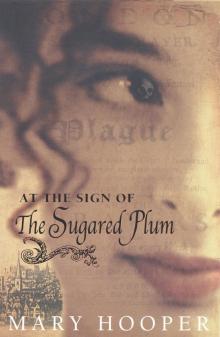 At the Sign of the Sugared Plum
At the Sign of the Sugared Plum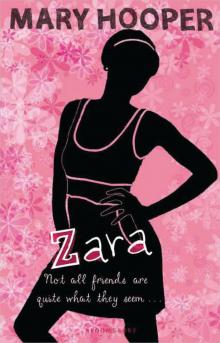 Zara
Zara Megan 3
Megan 3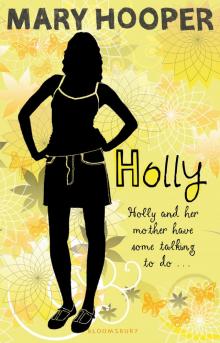 Holly
Holly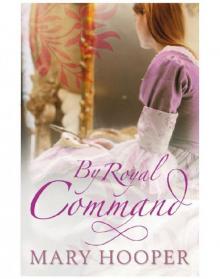 By Royal Command
By Royal Command Newes from the Dead
Newes from the Dead Amy
Amy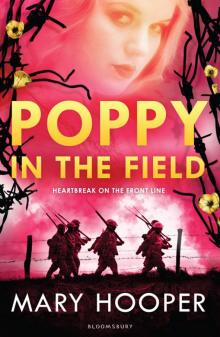 Poppy in the Field
Poppy in the Field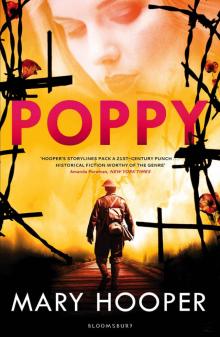 Poppy
Poppy Velvet
Velvet At the House of the Magician
At the House of the Magician The Remarkable Life and Times of Eliza Rose
The Remarkable Life and Times of Eliza Rose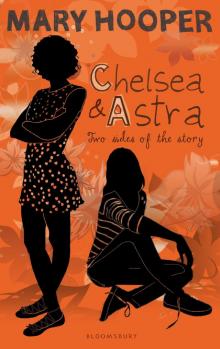 Chelsea and Astra
Chelsea and Astra The Betrayal
The Betrayal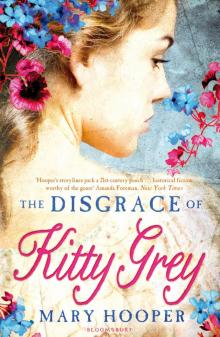 The Disgrace of Kitty Grey
The Disgrace of Kitty Grey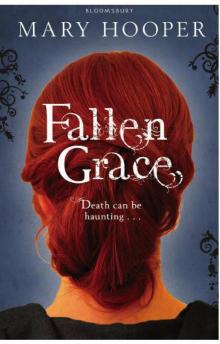 Fallen Grace
Fallen Grace